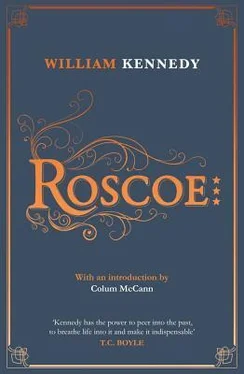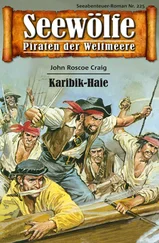“I can’t say.”
Roscoe slid Roy up the wall with one hand and held him there, the move pulling out Roy’s shirttail and tightening his collar into a noose.
“You’re a lying stringbean traitor. You were told no politics.”
“Let go of me, Roscoe,” Roy said, a windpipe croak.
“Why did you print that, Roy? Tell me why.”
“You people are in trouble,” Roy said.
Roscoe slid Roy down the wall and released his shirt. “Trouble?”
“You’ll probably beat it like you always do,” Roy said, righting his collar, “but you’re in for a dogfight.”
“With what dogs?”
“The Governor’s people know Elisha owned a block of whorehouses. That’s just the beginning.”
Roscoe’s right elbow suddenly bent upward, and his fist, from a position of rest, whomped Roy’s face with three rapid snaps of the full forearm, Roy’s head hitting the wall and rebounding into each new whomp.
“There, Roy,” Roscoe said as Roy stumbled sideways to lean on a desk, “there you have your headlines. Lawyer punches out editor for maligning his friend. Genuine news.”
As he left, Roscoe saluted the two reporters, who were out of their chairs, trying to decide how to rescue Roy. “See you later, fellas,” he said, reveling in the vision of Roy’s blood and licking his own bleeding Purple Heart, his big knuckle stabbed by Roy’s hostile fangs. He remembered his father’s commandment on justice — Never let an enemy go unpunished — and he thought, I did all right, Pa, didn’t I?
Roscoe drove twenty-five minutes to Patsy’s summer place to give him the news. It was situated on a Helderberg mountainside that gave a one-hundred-and-eighty-degree vista of Patsy’s Garden of Eden, the city and county of Albany. Patsy’s father had built a cedar-shingled summer bungalow on the land when he was sheriff. When the old man died, Patsy winterized the place, added a second story, built outbuildings to breed fighting chickens and a pit where they could fight. In the years after the Party took City Hall, the house became the summer hub of political action. Principal Albany Democrats made regular pilgrimages here to listen to Patsy the oracle tell them what they should think tomorrow.
Wally Mitchell, an ex-heavyweight who knocked down Jim Jeffries and was now Patsy’s driver and bodyguard, unlocked the chain across the driveway and waved Roscoe in. Such security had been the norm since a homegrown gang of bootleggers tried to shoot Bindy and later kidnapped his son, Charlie Boy McCall. Roscoe saw Bindy’s custom-made, bulletproof black Packard, and he parked alongside it. He stepped out into the sunshine of a clear August afternoon and could see everything, from the beginning of the patchwork fruited plain at the base of the mountains, all the way in to the tower of Albany’s splendid City Hall and the Al Smith State Office Building, Albany’s modest skyscraper. He saw the shadow of a cloud moving fast across the plain below, but in the clear, blue-white sky he could find no cloud. He saw Patsy and Bindy near the chicken coops and went to them.
“How fare the chickens of this world?” Roscoe asked.
“Chickens is chickens,” Patsy said. “Fight ’em and eat ’em.”
“The received wisdom of history,” Roscoe said. “Don’t you fellows have a main coming up?”
“Tomorrow night, up in Fogarty’s,” Bindy said.
“Been weedin’ out my sick ones,” Patsy said, a chicken under his arm. “One of my tough guys’s got the megrims, feedin’ it too much. And this guy got the chicken pox fightin’ his friends. His head’s pecked all to hell.”
The McCall brothers had raised chickens since early adolescence in North Albany. Later, when they moved to Arbor Hill, Patsy kept his coops in a stable next to his house on Colonie Street, but as the chickens grew in number he was deemed a neighborhood nuisance and told to get rid of them. A politically connected neighbor let him put his coops on the Albany County Courthouse roof, the beginning of Patsy’s life above the law.
Patsy put his poxy chicken back on the walk and led the way to the kitchen. Wally Mitchell was lifting a blue roasting pan out of the oven, two cooked chickens in it. He put forks under the chickens and moved them onto a white stoneware platter. The house smelled like Sunday.
“Cook those yourself, Wally?” Roscoe asked. Wally’s left ear, from heavy use by others, looked like a partly eaten chicken wing.
“I don’t cook,” Wally said. “I do the heavy liftin’.”
Rose Carbone, Patsy’s full-time housekeeper ever since Patsy’s wife, Flora, died, stood at the sink washing a pot.
“Did you make the gravy?” Patsy asked Rose.
“I did not and I would not and you know it,” she said.
“Good,” said Patsy.
Rose went out of the kitchen and Patsy said, “She’s all right but she can’t make gravy.” He took a tin of flour from the pantry and put the roasting pan with its drippings on the gas stove and lit the burner. He mixed the flour with some water, poured it into the pan as the drippings began to boil, added salt, pepper, a splash of Kitchen Bouquet, and water from a kettle, then stirred the mix with a wooden spoon. Roscoe knew better than to try for Patsy’s attention when he was cooking, so he sat at the kitchen table to watch a ritual that dated to their adolescent fishing trips, when Patsy cooked in self-defense against Roscoe’s and Elisha’s life-threatening concoctions; and again in the army in 1918, when shrapnel knocked Patsy off his horse; and after his leg healed they made him a cook’s helper. Patsy poured the thickened brown gravy into a bowl and set it beside the chickens.
Bindy came out of the bathroom into the kitchen. “You see that stuff in the Sentinel ?” he asked Roscoe.
“I have some serious news on that,” Roscoe said.
Patsy nodded and put down his spoon and the three men walked through Patsy’s workout room toward the parlor. Patsy punched the hanging bag and bent it in half. He sat in his parlor rocker, feet crossed on the floor, a book, Hard Times, open on his reading table, and under it the Sentinel. His brown fedora sat on a straight chair by the door under the holy-water font, which was a Christmas gift from Father Tooher, pastor of St. Joseph’s.
Roscoe sat in an armchair facing Patsy and Bindy, who weighed three pounds less than a horse and made Roscoe feel thin. Bindy sat on half the sofa, eating peanuts from a silver dish.
“I just punched out Roy Flinn,” Roscoe said.
“Nice,” Patsy said.
“That little pimple,” Bindy said.
“Veronica’s a nervous wreck. I only went down to yell at Roy, but then he said Elisha owned a block of whorehouses. So I hit him.”
“Good,” Patsy said.
“He said we’re in for a dogfight with the Governor. What do you make of that, Bindy?” Control of brothels and gambling had been Bindy’s responsibility since the 1921 takeover.
“Dogfight?” Bindy said. “I’ll tell him about dogfight. I’ll break both his legs. Put the Night Squad on him, Pat. Break both his legs.”
“You hear anything about raiding the whores?” Roscoe asked.
“They been snooping around Division Street,” Bindy said, “but it don’t feel like a raid.”
“Shouldn’t we close the whores down to be safe?”
“How will anybody get laid?” Bindy asked.
“Tell the boys to have a go at their wives,” Roscoe said.
“We’ll see a lot of rape.”
“This isn’t forever,” Roscoe said. “Just till we see the whites of their eyes.”
“If this goes public I’ll catch hell from the Bishop,” Patsy said. “Wouldn’t hurt to give the girls a vacation.”
“How could Roy say that about Elisha?” Roscoe wondered.
Читать дальше












